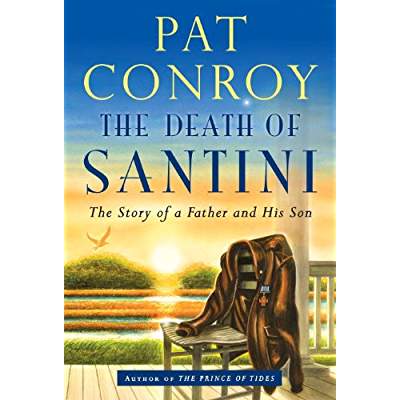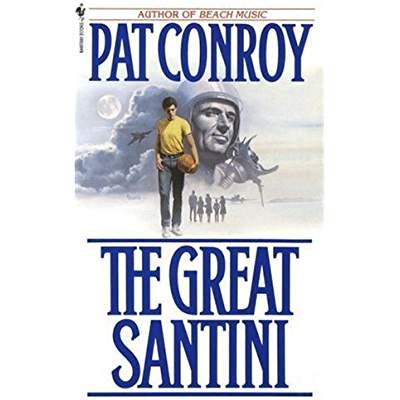Pat Conroy's books had been on my bucket list of books to read for several years. So in January, I planned to make it happen, my first choice The Great Santini, a book that had been made into a movie starring Robert Duvall as Marine Lt. Col. "Bull" Meecham ("Meechum" in the 1979 movie).
When I finished reading The Great Santini, I was convinced Conroy had suffered immensely as a child because of his father's erratic and volatile behavior. The words about Conroy's life at the hands of an abusive father poured out on the pages not only as a cathartic exercise of "writing what we know"--but also as an obvious way for him to process through the dregs of his life so he could heal.
After more research on Pat Conroy, my assessment was correct: the book was thinly disguised as his terrorized life. The book was a novel, however, the novel was based on Conroy's life lived under the heavy hand of a driven father, Donald Conroy, a very violent man and verbally abusive both towards Pat and his siblings with physical abuse unleashed upon his boys.
Then I read that Pat Conroy was ill. I was saddened when he passed on a few weeks later. But long before that, his mother's family--horrified at the revealing of family secrets--tried to get people to boycott his book signings by picketing his book events to urge people to stay away. His mother reportedly said, "Nice going, Pat, you stabbed your own family right through the heart." But Conroy kept writing about what he knew. What writers do.
Conroy would later say that The Great Santini had barely scraped the iceberg on the abuse in the family which was so bad (Pat recalled his mother brandishing a knife during a parental battle and his father knocking her to the floor and laughing), his mother divorced his father, and at least three of the seven children had suicidal episodes--one succeeding in leaving the world by his own hand with a sister being institutionalized. (Pat attempted suicide in 1975 after most of his life was spent battling depression and anxiety attacks.)

Even though Pat wrote, "I remember hating him even when I was in diapers," Pat asked for his father's help while writing the book--with Donald supplying technical details about military fighter planes--and this was a step in towards reconciliation. But after his father read the book, he was furious. Then he wept. Once The Great Santini was a success and made into a movie, there was a change in Conroy's father--he saw truthful tribute in his son's character portrayal and mellowed into a better man, mending relationships with his children and becoming a model grandfather. Too late for his marriage, he at least was able to reconcile with Pat and even attended book signings, signing, "I hope you enjoy my son's work of fiction,' and he'd underline 'fiction' five or six times," wrote Pat. "Then sign it, 'Ol' lovable, likable Donald Conroy.' Dear old dad also graced his car with license plates that read, 'GREAT SANTINI,' only after returning from a few days of disappearing after he'd read the novel--the family thinking he'd gone off to commit suicide."
Later, Pat wrote another book, a memoir, The Death of Santini. In it he recalls every harsh word and every beating from his father though his father is later shown as a better man in his golden years. "Love came in wounded and frantic ways to my dismaying family, but love it was." Rest in peace Donald and Pat.
Another noteworthy memoirist who has aired his dirty family laundry is Victor Marx who started All Things Possible Ministries. A sincere honest person who loves the broken people, Victor told his story in a book and in the documentary movie, The Victor Marx Story. Born in a family whose father was part of the Cajun mafia in Louisiana, a pimp, a drug dealer, and a father who denied Victor was his, Victor suffered every time his mother remarried--and she was married to six different men.

To sicken the drama, a man from a neighboring farm molested Victor at the age of five years old and locked him in a commercial cooler afterwards so he would freeze to death. Victor's life then became even more of a living hell. In later years, the PTSD and flashbacks almost drove his wife and children away until he received professional help through counseling.
But today, Victor, a former marine who has taught martial arts to many--including other soldiers and SEAL Team Six members, travels wherever he can to help in the United States and the Middle East to aid and encourage those children who have suffered from trauma (and those children incarcerated because of causing trauma to others) to give them hope. To share with them that their lives matter and if he can overcome adversity, so can they. Through his pain and life experiences, incarcerated children and battle weary children learn that there is a better way and that there is hope and a better life through Jesus Christ--the One who ultimately healed Victor so he could become victorious.
I can only imagine how the hearts of tormented readers who read these books and watch these movies feel when they finish the last lines of the books or stare at the fading movie credits. Perhaps they think, "And I thought I was the only one. But there are others out there who have suffered as I have. Perhaps there's healing and maybe I'm redeemable as well."
Sharing testimonies through nonfiction and memoir or autobiography is important. Memoir is so important or God wouldn't have had his prophets and Holy Ones writing down the good, the bad, and the shameful ugly of Old Testament and New Testament nonfiction characters and sinners who eventually overcame, some to walk with and teach about their Messiah. (Think Joseph: His brothers resented him and wanted to murder him. Think Moses: His brother and sister resented his authority. Think Jacob: He stole the birthright from his brother. Think Jesus: His brothers didn't at first believe he was the Messiah--the Anointed One. The list goes on and on.)
As Victor Marx has said, "Sometimes you have to revisit the past." And writers revisit the past until that story gets written. And if one person's story, good or bad, helps one person in this world, it's a success. Writing memoir sometimes heals more than just a writer's broken heart, it heals the broken hearts of others who read about a writer's pain, see themselves in the characters, whether it is written as nonfiction or disguised as fiction, and take hope in a satisfactory ending. Sometimes there isn't a satisfactory ending, but at least a reader can say, "I'm not the only one, there are others who know my pain, and the way I've been treated isn't normal. Perhaps I can stop the generational abuse from continuing."
Which is a good thing.
So don't let anyone stop you from writing your story, which is your testimony--because your story, is yours and yours alone to write.
Happy writing trails!
Comments anyone?
If you would like to comment or have questions about this article,
email me vmoss@livingwaterfiction.com




